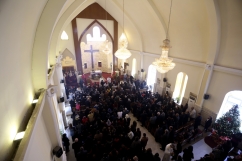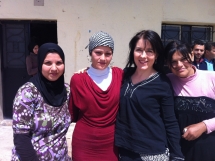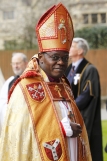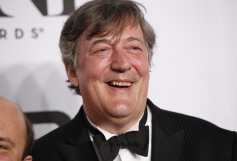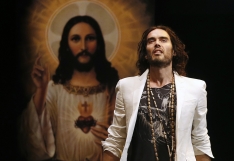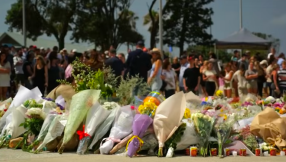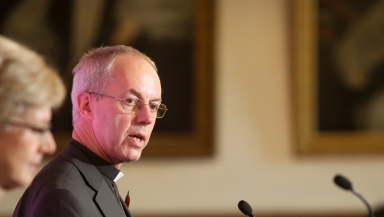
The Archbishop of Canterbury has defended the "freedom" of atheists to criticise God in the wake of debate surrounding comments made by Stephen Fry over the weekend.
Archbishop Justin Welby, speaking at the launch of the Religious Liberty Commission, a new body that will work on behalf of persecuted Christians, did not defend or criticise the substance of what Fry said.
Christians must speak out for others persecuted for their beliefs, whether it be religious or atheistic, he said. "Taking responsibility for someone else's freedom is as important as protecting my own. It is as much the right of Stephen Fry to say what he said and not to be abused by Christians who are affronted, as it is the right of Christians to proclaim Jesus Christ as their Saviour. That is his freedom to choose, that is given to us in creation."
Stephen Fry condemned God as "utterly evil, capricious and monstrous" on the Irish religious affairs programme The Meaning of Life on RTE television.
In an imaginary conversation with God, Fry said he would challenge him: "How dare you create a world in which there is such misery that is not our fault? It's not right. It's utterly, utterly evil. Why should I respect a capricious, mean-minded, stupid God who creates a world which is so full of injustice and pain?"
His comments would have seen him arrested or worse in some countries. A Christian couple in Pakistan were recently burned to death in a kiln after being accused of blasphemy against Islam.
The Archbishop welcomed the new commission, part of the Evangelical Alliance, which brings together Release International, Open Doors and Christian Solidarity Worldwide.
The level at which Christians around the world are being persecuted is increasing at an alarming rate, the new commission's leaders said at the launch, in St Mary Undercroft chapel in the Palace of Westminster. In the very birthplace of Christianity, the Middle East, the Christian faith is in danger of extinction. In more than 50 countries, discrimination, intimidation, violence or even death is the price many pay for their faith.
A victim of persecution in Eritrea, one of the world's most repressive regimes, gave a moving account of the suffering of Christians in his country.
Archbishop Welby said: "Although there's much talk of persecution in this country I think we need to distinguish our situation – as Rowan Williams did quite rightly – from the serious oppression in places around the world where the response to the call of Jesus to 'follow me' is forbidden."
He said the choice to respond in faith or not ran right through the Bible and freedom of religion was a fundamental human right, now enshrined in international law.
"And for those of us who are Christians, let's just be quite clear that the Church, including the Church of England, has a poor record in this as in many other areas, but perhaps in the last 300 years has begun to learn a little of where it went wrong."
Earlier, the Archbishop called on companies to pay more tax, especially in the countries where they make their profits.
He told the BBC: "There has always been the principle that you pay the tax where you earn the money, and if you earn the money in a particular country the revenue service of that country needs to get a fair share of what you have earned."
Calling for a simplified tax system, he continued: "We have got this unbelievably complex tax system internationally and in most countries."
A responsible approach to tax is part of a biblical mandate, he argued. "It goes back to the very basic principle as a Christian. We see Jesus Christ spoke of people paying what is due. The Bible speaks of it endlessly."
He admitted it was important to affirm the significance of those that generate and create wealth. "But we also need to be realistic about the fact and again this goes back hundreds of years. Adam Smith spoke about it: with wealth comes power and with power comes a temptation to misuse power. There is a reality of the human condition."










